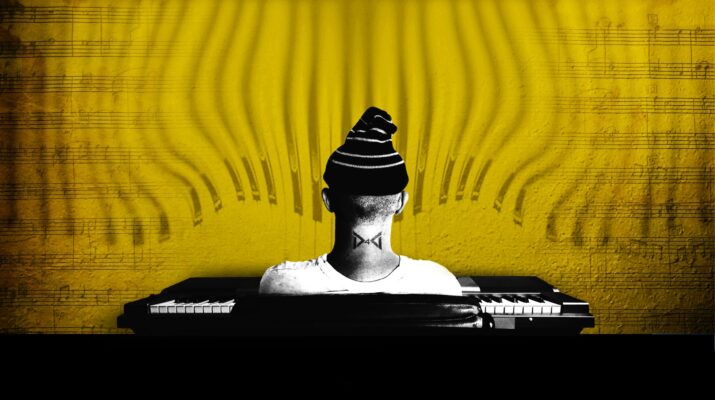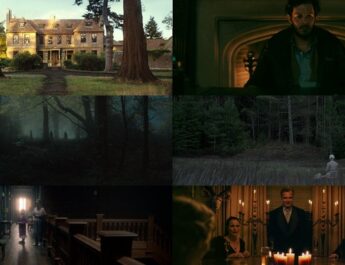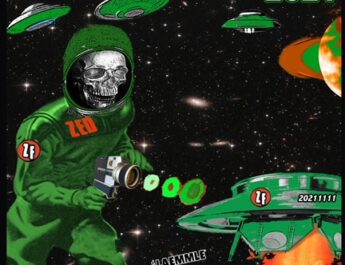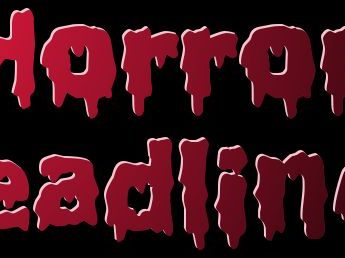We cover a lot of authors and filmmakers, but don’t often get to talk with musicians. When given the opportunity to speak with D4Disgruntled we couldn’t pass it up. It was very interesting to learn more about what he does, and how he creates his music for horror fans. We hope you’ll take a few minutes to read about that below, and a lot more…
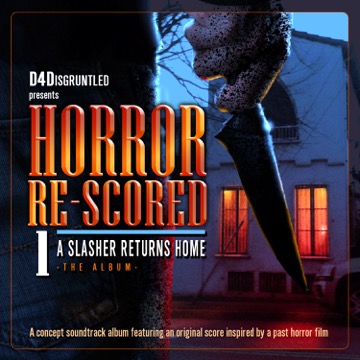
-PH: Please start by introducing yourself, and how you got started in music.
-D4Disgruntled: My stage name is D4Disgruntled but my actual name is Matthew C. Hightshoe. I am a 40 something guy who took the long way around to pursuing a career in music composition for movies, shows and games. The name was inspired by “V” for Vendetta but is an in-joke about creative people being disgruntled most of their lives. More importantly, the name D4Disgruntled symbolizes me finally getting over my own disgruntled mentality and acts a mirror to my current self so I do not return to that old mentality.
Originally from Indianapolis, IN but moved to Silver Spring, MD (outside of D.C.) at the age of 13 and would graduate from high school in 1993. I received a degree in Fine Arts from Indiana University – Bloomington, IN in 1999. I have been living in Los Angeles, CA since 2001.
As a kid, I was a percussion player in school symphonies. Also, I began noticing and remembering the music in movies. This led to me becoming a film music nerd and soundtrack collector (when I discovered the music was sold separate from the film) eventually directed me into studying music composition and theory in high school and college. While my professional career after college (for about 20 years) went a non-musical direction due to simply not having access nor the finances to get the resources necessary for being a music composer for movies, shows and games in the late 90s and early 2000s, I kept studying film music and collecting it.
Around 2013, began attending as many conventions and signing events as possible. By 2016, transitioned into Video Production as a self-employed videographer and video editor. I started a documentary about the soundtrack industry which had to be shelved after many interviews due to funding running out. However, this led to me producing (a yet to be released) video of the Killer Klowns From Outer Space Live-to-Film concert from 2018 (with behind-the-scenes footage and interviews) and being an assistant to horror film composer Richard Band whose website I manage currently.
In 2018, I decided to pursue music composition. I invested money and time in acquiring the necessary fundamental tools, training, and resources for today’s industry. The pandemic of 2020 and 2021, while horrible in and of itself for many, was a perfect opportunity for me to hunker down and focus on what I needed to do to make up for many lost years in composing.
-PH: Lots of people may think when you get into music you might want to be a DJ or in a band. What got you turned to music in films?
-D4Disgruntled: I think it was my being a film nerd and thinking I wanted to be a filmmaker one day. Spending so much time re-watching movies as I was studying them and learning how they were made exposed me to the music repeatedly. This made me realize and appreciate the soundscape being created in the film. Over time, I began to realize that I liked certain movies because of the music in them and not the movie so much. But until there was a soundtrack to the film with that music on the CD, I would own the movie as put it on in the background, just so I could listen to the music.
While in high school and living just outside of D.C> I went to Catholic University’s main cathedral and walked around the catacombs while listening to Damien: Omen 2 on my Walkman. I was one of very few teenagers that listened to film music on his Walkman while others were kickin’ it to the contemporary bands at the time.
-PH: And when you turned to films were you already a horror fan, or did you become one in the process?
-D4Disgruntled: I have always been a horror fan and dark have always been my escapism and the genres that attracted me the most in the 80s. I read Stephen King novels beginning in 5th grade while also reading C.S. Lewis’s The Chronicles of Narnia. In 6th grade I read The Amityville Horror novel and then saw the original film.
I think the dark and mysterious always fascinated me. To quote Beetlejuice, “I myself am strange and unusual”. I liked being scared while watching a horror film and still do, though as an adult it is more difficult as so many newer films play on old and tired tropes and formulas. The element of mystery, building suspense, shock, etc. all the hallmarks of creating a dark and brooding atmosphere has always intrigued me whether it was with sound effects or music.
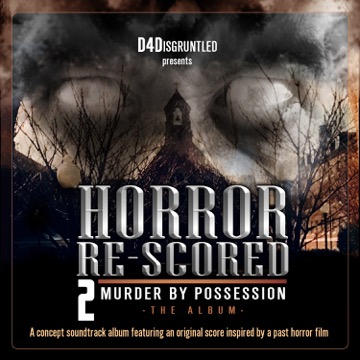
-PH:Tell us a little more about the music you make now. What’s the process like, and do you make it just for films?
-D4Disgruntled: While I am seeking professional composing gigs on genre movies, shows and games, I compose what I call “concept soundtrack albums”. These albums, while created for profit, demonstrate my ability to create thematic ideas and develop them over the course of 40 – 70 minutes.
There are two types of concept albums that I do.
The first type consists of me “re-scoring” a favorite horror film with a completely new, original, and alternate music underscore. This is part of an ongoing series called “Horror Re-Scored” and focuses strictly on finding horror films I like and creating new music for the film, regardless of my opinion for its existing score. The material is all mine and I avoid utilizing or even paying homage to any aspect of the musical ideas in the existing film.
The second type consists of me writing my own short stories (or high concept treatments) to which I then compose an original composition. These albums are stand-alone, one-off albums or EPs.
Stylistically, each album is quite different. I have incorporated more traditional approaches with sound design elements as well as experimenting with full on techno-inspired albums. Ultimately, the soundscape and composition are dictated by the story.
For each new project, once I establish the overall tone and central narrative themes, I establish the soundscape. For the Horror Re-Scored series, the visuals of the film to be re-scored play a huge factor in deciding what new soundscape I will conjure.
For 1 – 2 days for up to 8 hours each day, I sift through the hundreds of virtual instrument libraries and make notes any sounds that I feel help to establish the creepy sound scape I wish to create. I then reference these notes and reduce the list down significantly to the ones I truly decide to use. I play melodies and rhythms with each instrument and categorize them as to how I might use them.
Once the organization is done, I start composing using Digital Performer 10 (a DAW or Digital Audio Workstation) and my trusty Yamaha keyboard purchased from Best Buy 15 years ago, lol. As I mentioned before I have a slew of virtual instruments ranging from sound design to orchestral instruments to percussive loops. Then once the composition is finished, I do as much mixing as possible in the DAW before adding additional balancing and mixing in Adobe Audition from which the final music files are exported for use.
-PH: Is it harder making music for a certain genre like horror than maybe just films in general?
-D4Disgruntled: Horror is just as difficult, if not slightly more difficult, to compose for as it contains many of other genre elements like drama and comedy. Now, I have heard people make fun of horror music as being just a bunch of high- and low-pitched synth drones with the occasional jump scare, ear-piercing stingers. That is true in many cases. But there are examples of more complex orchestral and full on rock ensemble approaches. Budget does dictate the use of an orchestra vs. all synths vs, a rock ensemble but a clever composer will find a way to find a middle ground using both on even the most non-existent of budgets.
Also, while it may seem that “stinger’ placements for that jump scare would be obvious, it is all about the timing and the type of sound to use, how quick or drawn out should it be. In some cases, the director may not care as long as it hits the mark and is disruptive enough to achieve the final jolt..
Also, I think it depends more on the film itself. Composers, like any artist, if given some direction and then left alone, can solve the musical landscape issues of a film. But if all a director wants is sonic noise to create a mood and atmosphere rather than support the onscreen story, then you give them what they want. Hopefully, they allow for the composer to be as creative with the soundscape and treat it like a character in the film.
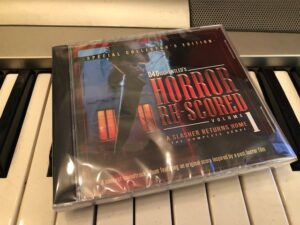
-PH: What are some of your influences both in horror, and music?
-D4Disgruntled: My earliest exposure to horror were movies such as Halloween, The Thing, Christine, The Fog, The Amityville Horror, Amityville 2, The Exorcist 1 – 3, Poltergeist, Alien, American Werewolf In London, The Omen 1 – 3, Phantasm, Nightmare on Elm Street 1 & 2, Hellraiser, The Serpent and The Rainbow, Night of the Living Dead, Return of the Living Dead, The Fly, Scanners, The Stuff, and Q-The Winged Serpent.
The music in many of these films stood out to me growing up. The low bass heartbeat like pulse during the opening of The Thing, the child-lke singing in Poltergeist & The Amityville movies, The creepy atonal stuff in Alien and The Amityville movies, the evil chanting in The Omen movies, the creepy melodies from Phantasm, The Exorcist and Halloween, etc. These are all things I at some point would come to want to compose myself.
Composers whose music caught my attention consisted of Jerry Goldsmith, James Horner, Christopher Young, John Carpenter, Danny Elfman, Basil Poledouris, Michael Kamen, Alan Silvestri and Hans Zimmer. Then additional favorites to follow were Howard Shore, Elliot Goldenthal, Marco Beltrami, Maurice Jarre, Ennio Morricone, Lalo Schiffrin, Elmer Bernstein, and many others as the years have passed.
-PH: What are some of the struggles getting your music out there, or finding films to work on?
-D4Disgruntled: Getting the music out into the public is not that hard as there are a plethora of online websites and platforms, web services, music libraries, and distribution services that you can post your music. I have utilized some of these and have my own website as well. Many of these cost money and you must figure out what is best for you price wise vs. public reach. In the end, there is still no guarantee you will get discovered and in today’s time, there is too much out there for a filmmaker or game developer to sift through. They are not going to come to you, you must go to them.
It is marketing myself in a way that will get me noticed that is the true struggle and becomes exhausting after a while. I cannot afford much in the way of paid marketing or hiring a marketing or promotional expert. Drawing upon my own abilities as a Graphic Designer, Photographer, Videographer and Video Editor allows me to create my own marketing content but not everyone is so lucky.
After a long day comprised of composing and mixing, the last thing I want to do is make marketing and video content for my social media profiles. My goal for now is not to gain followers but gain attention from potential employers. My marketing for the most part is reaching out to those who might hire me, not so much to obtain fans. Fans would be great, do not get me wrong, but they are not going to get me hired.
To help with finding films, shows or games to work on, I am looking into acquiring representation but discovering that they typically want a composer who has credits of some kind whether the film was in festivals, won awards, was distributed theatrically or direct to video / streaming. Student films really do not blow their skirt up over their heads. But there may be one or two agents that are willing to take a chance, so it is still worth submitting your work.
It was recommended to me to sign up with IMDB Pro (paid service) to obtain information about upcoming productions and their contacts. I have profiles set up on various job board sites like Indeed, LinkedIn, Zip Recruiter, and others. Craigslist used to be a great place for gigs but not so much anymore as I cannot seem to get a response from anyone, regardless of whether it is for music, editing or design. I even tried UpWork and Fivrr and those are major money sucks for me. I have encountered other sites like this where you pay to have access to “exclusive” job postings, and it is all a load of crap.
Attending conventions, signing events, and networking events are a great way to introduce yourself in person to filmmakers and game developers. However, my struggle with this is these cost money and time off, both of which I do not always have enough of. The pandemic has now made this option non-existent. Now, much of what I am left with is the researching and reaching out to potential filmmakers and game developers via email and social media.
These days, there is no one concrete way of breaking in anymore, there are too many and that in my mind is now more of a hinderance. At the end of the day, what it all comes down to ultimately is who you know.
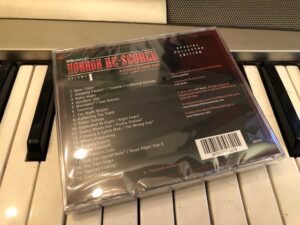
-PH: You recently released the albums ‘Horror Re-Scored’ Vol 1 and 2. Can you tell us how you created them, and the kind of music fans will find on them?
-D4Disgruntled: Horror Re-Scored: Vol. 1
Horror Rescored: Vol. 1 is special for me as it marks a symbolic return to a project that originated over 20 years ago. When I was a teenager studying composition and becoming a film music nerd, I started practicing re-scoring scenes in movies. Being a horror fan and was able to play John Carpenter music, I created my own horror themes and motifs. I chose Halloween 4 to re-score back then. I created up to 30 to 40 minutes of music (which I still have recordings of). I had always wanted to return one day and revamp the musical ideas. Thus, Horror Re-Scored: Vol. 1 was born.
Halloween 4 was The Return of Michael Myers and me returning full force to scoring music to a film. I pretended I had been hired to score the film back in 1988 and created a full 58-minute alternate score. The original spotting of the music (the moments in the fil that are preselected by the director and composer to which to compose music) was done so well that I simply chose the same moments. The in and out points as well as the time durations may be slightly different with my music, but it was close. Additionally, there are scenes that had no music that could use some and composed something for them.
My approach to the updated musical soundscape was to use synths and instrument combinations that sounded like 1988. None of the iconic Carpenter material is used, it is all different themes and motifs, but retains a similar feel and tone the way Alan Howarth tried to maintain a similar feel when he scored Halloween 4. There are ghostly ambient sounds, organs, echoing synth beeps, electric drum kits and other metallic percussion, creepy cricket-like effects, piano, synth strings, and a modified synth guitar.
Structurally, the music evolves from a ghostly and atmospheric composition to something harsher and concrete, representing the perception of Myers returning to Haddonfield by others is changing from a disbelief to a harsh reality. Myers gets a motif that is heard mostly in a ghostly form for the most part while appearing on trickling piano during stalking and lurking scenes. The Hunt theme (which I would call the alternate Halloween Theme) is used for Loomis as he is always 1 or 2 steps behind Myers. There is a Carpenter-esque stalking 4 note motif that is heard in almost every cue but takes on different guises musically to indicate he is omni-present and always watching. Finally, there is the bitter-sweet motif for Jamie which evokes her apprehensions, anxieties, and fears.
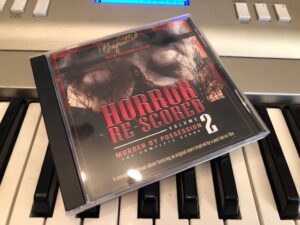
Horror Re-Scored: Vol. 2
Horror Re-Scored Vol. 2 was my favorite to work on out of the two re-scores so far as it had far more challenges. The film used was The Exorcist 3 and is one of my all-time favorite horror films, more so than the original Exorcist.
The film has little to no music and is dialogue heavy. This allowed for me to “spot” the film personally. The dialogue is some of the best dialogue written in a film so composing music that would not disrupt the cadences and the flow was difficult. The music for the most part had to be transparent, thin sounding, almost ambient as to not become to intrusive and not draw too much attention to itself during key dialogue scenes. Then, during the more dramatic moments, I went almost over the top, much in the way the film is structured narratively.
Much like the methodical actions of the killer in the film, I had to be methodical with the composition structure. I figured out a formula for scoring many of the dialogue heavy scenes. Almost every dialogue scene in the film is structured with the most important aspect of the conversation beginning in the middle and resolving by the end. This resulted in many short cues. The first half is somewhat fluff and lead into the heart of the talks. So, for scenes I decided to put music to, I started the music n the middle of the dialogue and ended it when they finished.
The soundscape is dark, spiritual and exhibits much angst and sense of loss, as reflected in the Kinderman character over his loss of faith in God and the loss of his friend, father Karras. The music I composed for the main titles over shots of Georgetown at night is comporised of all the musical ideas to be developed further throughout the score.
I used detuned bells with lots of varying delays and reverb to give it “echoes of the past” feel. This is the main theme used for moments reflecting on past events from the first film. A simple yet angst spiritual tune played on a a synth pad / string is used for the loss of faith narrative weaved throughout the story. There are 2 different synth choral pieces – one used for key moments throughout the murder investigation and the other for moments where the forces of good are threatened. Finally, there is the sound design soundscape created for the killer and his mechanical way of thinking. This music retains what I call an industrial factory sound. Lots of clanging metals of all pitch ranges, acoustic drums, rattling and shaking instruments, to give almost a primal feel. Everything gets interwoven by the end as the character’s lives become interwoven and entangled.
Side note, I discovered that Christopher Young, composer of Hellraiser, had been hired back then to replace the Barry De Vorzon score. He wrote 22 minutes of an alternate score before the director fought and won to keep De Vorzon’s score intact. Young’s score was never recorded. This inspired me to create a score that paid homage stylistically to Young’s music of the late 80s as he is one of my top 3 favorite film composers.
-PH: What kind of horror and/or music fans do you think would enjoy the albums?
-D4Disgruntled: I would hope horror fans would find something about my music that interests them. My horror re-scores are given more attention by passive or non-horror fans for some reason. I fear my work with re-scoring horror films may be viewed as sacrilegious to the more hard-core audience, lol. My dark techno inspired work on my other albums has been attracting more “Synth-Wave” musicians and “Synth-Wave” fans which then converts them into liking my horror music albums. So hopefully, in time, I will gain a following and maybe a filmmaker or two as well.
-PH: Will there be a third volume to follow those up with? If so, is there anything you can tell us about it?
-D4Disgruntled: There will be a third volume as I am currently working on it. The film I am re-scoring is Pumpkinhead. I am going to give it a full on true atonal / modernistic music soundscape like The Witch but with additional sound design synths and percussion that give it a more primordial, primitive feel and creepy feel. I also will be replacing the music representing the countryside and country folk with something less country twang.
The Horror Re-Scored concept is an ongoing series of “concept soundtrack albums” and is going to branch off into an additional series of albums called Sci-Fi Re-Scored. The first film in that series will be The Blob remake from 1988.
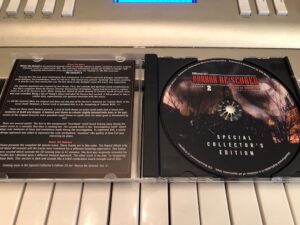
-PH: Here’s your chance to promote anything we haven’t talked about. Let us know something more about your music, albums, upcoming projects, where fans can find you, or anything else you would like to mention.
-D4Disgruntled: Alright, now it is time for my shameless promotion segment.
The Horror Re-Scored volumes are available as digital downloads (see links below). They consist only of select tracks from the larger composition and are re-ordered for a different listening experience. For those who like the albums and want more, I have released Special Collector Edition CDs that feature the complete compositional work I composed for the film. The tracks are in chronical film order. For all future “Re-Score” albums, this will be the format.
For those who are curious to see how my music works in the films for which they were composed, I have posted on my YouTube Channel, video clips of selected scenes and synced my music back into in the scene. Most of the Exorcist 3 stuff allowed for more dialogue to be heard over my music. Halloween 4 however, most of it plays out like a silent movie, without dialogue and sfx, just the music is heard.
I have been busy with entering scoring competitions as another way of getting noticed and some nomination accolades. Also, I am doing some “spec” composing work for an individual by the name of “Strange Nocturnal” on a super-secret hush project all the month of May and part of June.
Horror Re-Scored Vol. 3 is on hold for now while I complete the above projects and contests and will resume in July of this year. Then followed by Sci-Fi Re-Scored: Vol. 1 in August. The timing would work out better as it would be closer to the grand old horror month, October.
I mentioned that I also do dark techno and sound design inspired music. There are two albums I did which you might want to check out as well (available at the links below), “Sykosis” & “Societal Chaos”. A third one is on the way and will be a sci-fi mystery action inspired album using much more techno and dubstep styled music. It will be called, The Erehwon.
Currently, I am for hire. Since I am starting out, I work cheap, for now. Do not worry about the quality being bad, my mantra has always been to do a lot with just a little. And in exchange for being affordable, there are certain licensing and rights limitations granted on both sides. Contact me for more details.
In the meantime, be unsafe, be scared and commit atrocities left and right.
Contact Info:
D4Disgruntled
(real name Matthew C. Hightshoe)
Located in Los Angeles
Email: d4dthecomposer@gmail.com
Website: www.musicbyd4d.com
Facebook: https://www.facebook.com/D4Dthecomposer
YouTube Channel: https://www.youtube.com/channel/UCIiCTQj4K3fIHTdbvgzBDKw
LinkedIn: https://www.linkedin.com/in/d4dthecomposer
Instagram: https://www.instagram.com/d4dthecomposer
Twitter: https://twitter.com/D4Dthecomposer
Minds: https://www.minds.com/d4dthecomposer
Bitchute: https://www.bitchute.com/channel/d4dthecomposer
Bandcamp: https://d4disgruntled.bandcamp.com
Also on various Music Streaming Sites: Amazon Music, Apple Music, Spotify, Tidal and Deezer
Thanks
We would like to thank D4Disgruntled for taking the time to answer our questions. Hopefully this was a good introduction to his music, and what it takes to create and get it out to fans. Please consider checking out his albums, and if you need music for an upcoming film please feel free to contact him.

